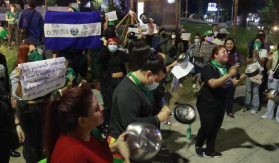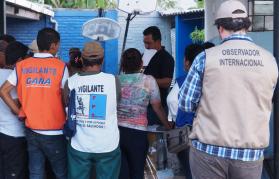El Salvador Declares 100th Municipality Free of Illiteracy
On September 22, Salvadoran President Salvador Sánchez Cerén declared New Trinidad in Chalatenango the 100th municipality in El Salvador to be “free of illiteracy.” As of early November, the total has grown to 111. This milestone in the hugely successful National Literacy Program, which shares a lifespan with the tenure of the FMLN administration, is a glimpse into the promise of this progressive government and reflects a coordinated effort between volunteers, a variety of national institutions, and local municipal governments. It’s one of many of the FMLN’s concrete achievements that have been severely underreported by media and buried in the discourse of gang violence and crime that both the Salvadoran right-wing elite and US government prefer to keep in focus.
Since the Ministry of Education launched the literacy campaign in 2010, a total of 300,000 people have achieved literacy. This figure includes nearly 24,000 people in the first half of 2018 alone as a result of an intensive push designated the “Year of Literacy.” El Salvador now has a literacy rate of approximately 88%, which puts it ahead of the US at 84% (US Department of Education, 2003) and has committed all resources available to achieving country-wide literacy by the end of 2019. This remarkable success has been lauded by international groups including the World Literacy Foundation and the Central American Integration System (SICA), which recently promoted El Salvador as a model for the rest of Central America and the Dominican Republic.
Most importantly, of course, the results are realized in the lives of the people who participate: “I’m one of those people who didn’t know a single letter. Now we’re learning something that will keep us from being discriminated against. Because that’s what happens when you don’t know something - you get pushed aside,” said Ricardo Mendez, one of the graduates present at the milestone event.
The volunteer-based program operates by enlisting two different groups of teachers: middle and high school students who fulfill their community service hours by volunteering to teach in the program and other citizens who wish to contribute. For both groups, the Ministry of Education provides training, materials, follow-up, and support. The ratio of teacher to students in the program is generally one to ten.
Women benefit most from the initiative, making up 67% of the participants. In a country where women and girls have been historically and systematically denied access to education, this is a doubly significant achievement. Likewise, the inclusive campaign design addresses other educational disparities head-on by offering, for example, literacy programs in Braille and sign language and by coordinating outreach between government offices and local municipalities to identify concentrations of illiteracy among the population. As a result, people in rural communities, people with disabilities, and people who are incarcerated, populations regularly dispossessed of formal education, have now outpaced their urban, non-disabled, non-incarcerated counterparts with regards to literacy. Outcome-oriented programs like these that confront structural inequalities demonstrate the FMLN’s continued commitment to social transformation from the bottom up.
The success of the literacy program falls in line with a significant set of achievements over the course of the FMLN’s two presidential terms that the right-wing-controlled Salvadoran media have consistently obscured, misrepresented, or denied and that the US and international media have largely ignored. To name a few:
● The Social Education Plan provides uniforms, shoes, supplies, and meals to public school children and was recently expanded to serve high school students
● Millions of dollars have been invested to repair school buildings and infrastructure, implement extended day programs in literature and music, guarantee free higher education to students attending public high schools, and deliver training and development to more than 9,000 teachers.
● The National Health Policy has expanded access to healthcare by opening new hospitals and repairing older structures, developing Community Health Teams (Equipos Comunitarios de Salud, ECOS) in rural communities, and opening maternity care centers, all of which helped El Salvador achieve the UN Millennium Development Goal of improving maternal health ahead of schedule.
● The government provides subsidies for liquefied gas, electric power, and collective transport to working-class families, despite pressure from the International Monetary Fund to eliminate all state subsidies as an austerity measure.
● The creation of a new Ministry of Culture, including the approval of a Culture Law in 2016, that seeks to protect and promote the country’s national art and culture and support artists, youth and indigenous communities, including protecting sites of cultural significance.
● The Special Comprehensive Law for a Life Free of Violence against Women attempts to address gender violence, while the “Women’s City” initiative (Ciudad Mujer) provides comprehensive care, resources, and professional development to nearly two million women in the areas of sexual and reproductive health, gender violence, economic autonomy, land management, and child care among others.
● The 2017 approval of a national ban on mining made El Salvador the only country in the world to have achieved such a victory.
● The Access to Public Information Law created open-government “portals of transparency” in public institutions and requires all government agencies to publish annual public reports.
● The National Policy for the Protection and Development of Salvadoran Migrants & Family establishes protections for this vulnerable population.
The under-reporting of such reforms and many more has had a significant effect. One widely-accepted reason for the FMLN’s loss of legislative seats in the March 2018 elections was people’s “loss of faith” in the FMLN. But the image of the party as a failed revolutionary movement that has been unable to execute its vision stems more from right-wing media distortion and invasive US rhetoric than the reality of the past ten years of governance.
In two terms, the party has managed, despite the opposition constantly blocking funds for government programs and attempting to destabilize the government in what the FMLN and the social movement have described as “soft-coup” maneuvers, to enact historic social, economic and political advances in El Salvador, even if these changes are slower to fully manifest than the needs demand.



